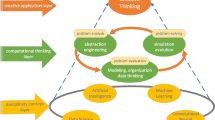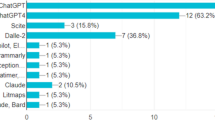Abstract
This study analyzes the process of integrating artificial intelligence (AI) content into a computer graphics (CG) course for architecture students at a Taiwanese university. The university places a high priority on AI education, and students are required to pass an AI competency test to graduate. The CG course is well-suited for integrating AI components since it relies heavily on visualization and graphics. The study collected both quantitative and qualitative data to assess student reactions and learning outcomes with the new AI content. An end-of-course survey revealed very positive responses. 78–100% of students agreed that the course helped increase their knowledge of AI and awareness of its applications. Further insights were gathered through follow-up focus groups. Students were optimistic about AI learning and did not feel that it detracted from their core architecture studies. However, they suggested slowing down the pace of AI content delivery. While students acknowledged the potential for applying AI in areas like construction visualization, they had a limited view of its broader professional impacts. In summary, this exploratory study suggests that incorporating AI content into an existing technical course was well-received by students and may have improved engagement for struggling learners. However, careful integration is necessary to avoid overwhelming students with too much new material. The study also discusses implications for curriculum design theory and preparing students for AI's professional impacts.
Access this chapter
Tax calculation will be finalised at checkout
Purchases are for personal use only
Similar content being viewed by others
References
王如哲: 2030 高等教育之未來趨勢及創新發展. J. Edu. Res. (1680–6360) 333 (2022)
使命願景 - 中華大學 Chung Hua University: https://rpage.chu.edu.tw/p/412-1000-508.php?Lang=zh-tw. Last accessed 14 March 2024
AI+體驗與資訊教育 - 中華大學 Chung Hua University: https://www1.chu.edu.tw/p/412-1000-490.php?Lang=zh-tw. Last accessed 14 March 2024
學生AI能力檢定實施辦法 - 中華大學 Chung Hua University: https://ai.chu.edu.tw/p/412-1072-2941.php?Lang=zh-tw. Last accessed 14 March 2024
跨域AI專業課程 - 中華大學 Chung Hua University: https://ai.chu.edu.tw/p/412-1072-3068.php?Lang=zh-tw. Last accessed 14 March 2024
Chiu, T.K.F., Chai, C.-S.: Sustainable curriculum planning for artificial intelligence education: a self-determination theory perspective. Sustainability 12(14), 5568 (2020)
Kopcha, T.J., Neumann, K.L., Ottenbreit-Leftwich, A., Pitman, E.: Process over product: the next evolution of our quest for technology integration. Education Tech. Research Dev. 68, 729–749 (2020)
Li, S.F., Ng, K.K., Lee, L.K.: A Study on the Application of AI Experiential Learning in the Architecture and Design Courses of a Taiwan University. In: Li, R., Cheung, S.K.S., Iwasaki, C., Kwok, L.F., Kageto, M. (eds.) Blended Learning: Re-thinking and Re-defining the Learning Process, ICBL 2021. Lecture Notes in Computer Science, vol. 12830, pp. 103–115. Springer, Cham (2021)
Hennink, M.M.: Cross-cultural focus group discussions. In: A new era in focus group research: Challenges, innovation and practice, pp. 59–82. Palgrave Macmillan, London (2017). https://doi.org/10.1057/978-1-137-58614-8_4
Akyildiz, S.T., Ahmed, K.H.: An overview of qualitative research and focus group discussion. Int. J. Acad. Res. Edu. 7(1), 1–15 (2021). https://doi.org/10.17985/ijare.866762
Huang, J., Saleh, S., Liu, Y.: A review on artificial intelligence in education. Acad. J. Interdiscipl. Stud. 10(3) (2021). https://doi.org/10.36941/ajis-2021-0077
Sanchez-Gonzalez, M., Terrell, M.: Flipped classroom with artificial intelligence: educational effectiveness of combining voice-over presentations and AI. Cureus 15(11) (2023). https://doi.org/10.7759/cureus.48354
Adam, S.F.: An introduction to learning outcomes a consideration of the nature, function and position of learning outcomes in the creation of the european higher education area. EUA Bologna Handbook: Making Bologna Work 4, 2–22 (2006)
Laura, A., Outhwaite, A.G., Pitchford, N.J.: A new methodological approach for evaluating the impact of educational intervention implementation on learning outcomes. Int. J. Res. Method in Education 43(3), 225–242 (2020). https://doi.org/10.1080/1743727X.2019.1657081
Author information
Authors and Affiliations
Corresponding author
Editor information
Editors and Affiliations
Rights and permissions
Copyright information
© 2024 The Author(s), under exclusive license to Springer Nature Singapore Pte Ltd.
About this paper
Cite this paper
Ng, KK., Li, SF., Lee, LK., Luk, L. (2024). A Case Study Examines How a New Content Integration Impacts Learning Outcomes with AI Experience Inputs. In: Ma, W.W.K., Li, C., Fan, C.W., U, L.H., Lu, A. (eds) Blended Learning. Intelligent Computing in Education. ICBL 2024. Lecture Notes in Computer Science, vol 14797. Springer, Singapore. https://doi.org/10.1007/978-981-97-4442-8_10
Download citation
DOI: https://doi.org/10.1007/978-981-97-4442-8_10
Published:
Publisher Name: Springer, Singapore
Print ISBN: 978-981-97-4441-1
Online ISBN: 978-981-97-4442-8
eBook Packages: Computer ScienceComputer Science (R0)




